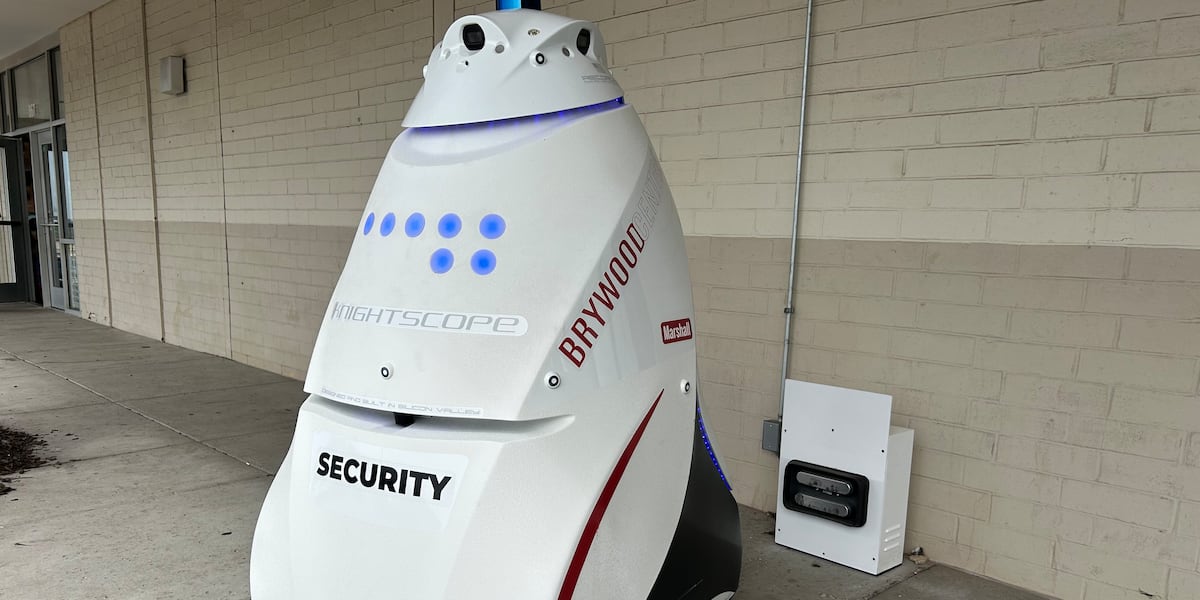KANSAS CITY, Mo. (KCTV) - A sight previously thought to be science fiction is very real at a southeast Kansas City shopping center. Instead of a police officer, a security robot has been patrolling sidewalks and shoppers are taking notice.
Since Marshall the robot has been on the job, shoppers say the experiences have completely changed when they come to these stores. The robot can spend 23 hours a day monitoring the parking lot from all angles which gives people a new sense of protection and ease they don’t always have when out.
Marshall took over security at Brywood Centre in April. Before that, Karen White noticed a lot of trouble outside the shopping center.
“Sometimes it’d be concerning for your car like someone could take it or something,” White said.
Knowing now that Marshall is always watching, the risk of crime does not worry her or others as much.
“It made it very better, like you can’t be in the parking lot without seeing the robot,” White continued. “So, I think it scared them off.”



They feel like there is less crime, because they have bought into security theater.
Ironically security theater can have a a placebo effect on crime rates as well. It turns out that the likelihood that someone commits a crime is strongly correlated to the chance they believe they will get caught, not the actual chance of getting caught. That’s why fake security cameras are so effective.
Like the ADT signs people get off of Craigslist.
Hate to say it (re: security theater), but I think that is correct. I’ve read articles stating a drop in crime in places where they just have a cardboard cutout of police officers in the window.
“It is not the severity of punishment that deters crime, but the certainty of punishment.”
Bullocks. You could make the crime for stealing death and execute everyone who does. There would still be stealing.
Simply put most criminals don’t think about consequences.
I think you may have misread their comment.
It make sense, when you make a decision you make it based on the data you have not the truth. So security theaters are effective as long as people who are thinking about commiting a crime think it is working. And they care about getting caught.
I’m pretty sure that simply putting a picture of eyes in the scene reduces theft. People are emotional creatures , and if they feel like they’re being watched by someone who doesn’t approve of stealing, they’re more likely to refrain.
“Fifty thousand years ago there were these three guys spread out across the plain and they each heard something rustling in the grass. The first one thought it was a tiger, and he ran like hell, and it was a tiger but the guy got away. The second one thought the rustling was a tiger and he ran like hell, but it was only the wind and his friends all laughed at him for being such a chickenshit. But the third guy thought it was only the wind, so he shrugged it off and the tiger had him for dinner. And the same thing happened a million times across ten thousand generations - and after a while everyone was seeing tigers in the grass even when there weren`t any tigers, because even chickenshits have more kids than corpses do. And from those humble beginnings we learn to see faces in the clouds and portents in the stars, to see agency in randomness, because natural selection favours the paranoid. Even here in the 21st century we can make people more honest just by scribbling a pair of eyes on the wall with a Sharpie. Even now we are wired to believe that unseen things are watching us.”
― Peter Watts, Echopraxia